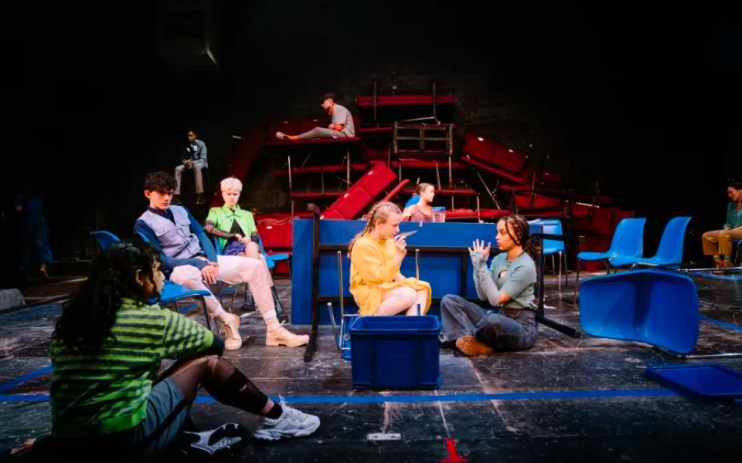The Trials at the Donmar – near future warning with adults in the dock

As Europe endures its hottest summer on record, hosepipe bans reach millions of Londoners and wildfires tear across Spain, new environmental polemic The Trials couldn’t have come at a more apt time.
Set in the not-too-distant future, it’s essentially 12 Angry Children doing jury duty at the end of the world. Those on trial: the likes of you and I, who continue to take flights and eat meat even as the world literally burns.
As subtle as a sledgehammer, Dawn King’s (Foxfinder, Salt) production is all about the children of today passing fiery judgement. Those playing the jurors were picked from a school outreach programme that whittled down 1,400 young people to the 12 we see on stage, several of whom are making their acting debuts.
Through a series of monologues we meet the accused (played by industry veterans Nigel Lindsey, Lucy Cohu and Sharon Small). An oily advertising exec who says he was just trying to do right by his children. A playwright who attempts to justify her carbon footprint by claiming her writing proselytised about the environment. A petroleum company employee who headed up the firm’s “green energy” wing.
“We got an organic vegetable box,” pleads one.
Then it’s over to the youngsters – dressed in what looks like early 90s rave gear and wielding gas masks and inhalers – to decide who lives or dies.
The play does little to hide the fact it’s a thinly-veiled series of thought experiments, with each character essentially a lever to pull or a button to press in pursuit of some elusive truth. Does caring exclusively for your kids make you a better person or a more selfish one? Does being a member of the Green Party excuse your lifestyle choices? Does being part of an apparently unassailable system abdicate you of responsibility?
First performed in Germany, there are clear and, I think, rather problematic parallels with the Nuremberg Trials (made explicit as the play progresses). At best it evokes Godwin’s law and at worst likening people who go on ski trips to those who worked in Auschwitz feels… not great.
Anyway, in this world the CEOs and the super-polluters have long since been “euthanized” – we’re now dealing with the regular joes, the equivalent of Nuremberg’s book-keepers and delivery men, who claim to have been ‘just following orders’.
The percussive pace is occasionally interrupted by scenes in which the children imagine the things of which they have been deprived: snow, air travel, meat. Stretching the limits of the already pared-back set – which feels more Fringe than West End – these lack the emotional punch they’re clearly supposed to deliver.
Still, the young actors play their roles excellently, debating and scrapping and flirting like the teenagers they are, trying to make sense of the broken world they’ve inherited. I’d be astonished if some of them don’t go on to become household names.
Despite being held back by the text’s freight-train directness, The Trials hits home thanks to its young cast, whose very presence feels like an uncomfortable foreshadowing of terrible things to come.
